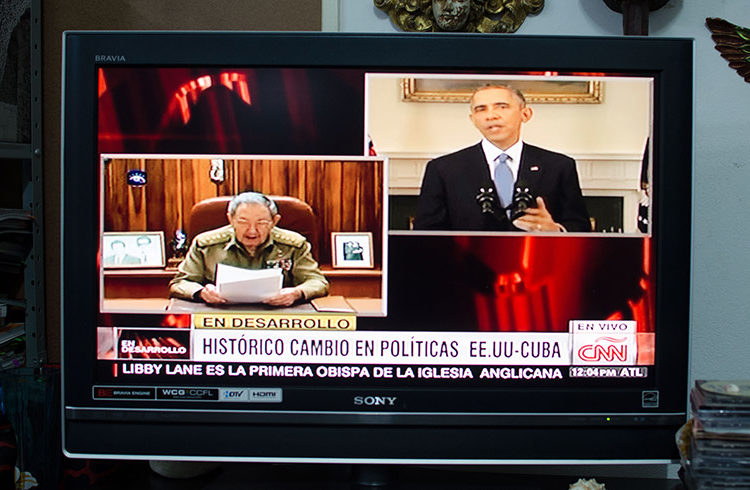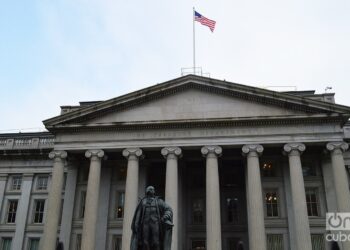In the long history of relations between Cuba and the United States, the agreements reached between Presidents Raúl Castro and Barack Obama are unprecedented neither in form nor in content, nor even in their magnitude. It was something symptomatic of the new phase being experienced those negotiations to culminate with two novel facts: the telephone conversation between them on December 16th and the simultaneity of television speeches the following day.
It is as if the two presidents would like to demonstrate to their respective nations and the entire world public opinion their express wish to leave behind the disagreements that had separated their governments since January 3, 1961, where Washington broke the existing diplomatic relations. Their effects will be felt in the coming years not only in terms of Cuban-American bilateral ties, but rather in the domestic situations of both countries, the hemispheric and possibly globally relations. We have moved from the incipient melting which we mentioned in our previous work to a radical shift in relationships.
The first to mean is the diplomatic negotiation itself. It was a negotiation that, despite occurring between two nearby and asymmetric antagonists, whose conflict has festered over the years, led to a result of “win-win”. That is, both parties achieved the results they wanted, for which they did not hesitate to make mutual concessions. It was obviously difficult for both of them.
Both the two leaders and their negotiating teams found a creative and practical solution to the problem of their citizens detained in jails of the other (three of the Cuban Five and Alan Gross), a matter that was a seemingly insurmountable obstacle, without any of the two parties to suffer political damage or lose prestige. I am referring in particular to the case of the American. In the avalanche of critical comments that have seen light in right-wing media in the United States, the issue of having freed the Cuban anti -terrorist agents has barely appeared, contrary to what all the experts predicted. This is remarkable.
In what we might call the core of the agreement, which is a radical shift in relations, there was not only creativity and realism but daring. Most of the experts from both countries had always believed that the normalization of diplomatic relations should be the culmination of a more or less prolonged process during which blockade should end, Cuba should be removed from the list of terrorist states and subversive activities against the Cuban government should cease. There were also issues that Americans would prefer to resolve before resetting diplomatic relations, for instance the compensation for nationalized US properties at the beginning of the Revolution.
Indeed, the Helms Burton Act proclaims, in one of its articles that: “The solution of the problem of nationalized property” is sine qua non condition for normalization of relations. The text can be found in Section 207 (5) (d) of the Act which states: “It is the sense of the Congress that the successful solution to the property claims by a Cuban government recognized by the United States remains an essential condition for the full reestablishment of economic and diplomatic relations between the United States and Cuba. “Although in the legislative lexicon of the neighboring country the term” sense of the Congress “is not binding, is an important legal restriction on what the Executive can do. Obama, by taking this step, has faced directly to the text of the Act.
Hence the importance of presidents and their negotiating teams to have reversed the process and have begun by the end: the reestablishment of diplomatic relations as a first step towards the eventual standardization.
What is decisive, from the Cuban point of view, is that, at a stroke, Washington has recognized the legitimacy of the Cuban government -that is something essential when talking about diplomatic relations, which enables progressing in any negotiations with the United States of national interest, including for example the return of the territory illegally occupied by the Guantanamo Naval Base. Moreover, the measures announced by President Obama regarding the removal of Cuba from the list of countries sponsoring terrorism of the State Department and in respect of penalties, although they do not eliminate the so-called “embargo”, take away considerable pressure to the Cuban economy and open a crack in the blockade that could begin to expand as it progresses.
Technically we are talking about the reestablishment of diplomatic relations between the two states, which they previously had. This is legally different from what happened between the US on one side and China and Vietnam on the other at the time. Both in one as in the other, new states were created, the People’s Republic of China (PRC) in 1949 and the Democratic Republic of Vietnam in 1954. In the first case Washington did not recognize the new government in Beijing emerged from the Chinese Revolution and held diplomatic relations with the Republic of China, which was established in Taiwan . The recognition and establishment of diplomatic relations with the PRC came after a long period of rapprochement started with the secret visit of Henry Kissinger to China in 1971 and visits to Beijing by the Presidents Richard Nixon and Gerald Ford in 1972 in 1975.
In the second, due to the division of the country during the Geneva Peace Conference on Indochina, which is now the Socialist Republic of Vietnam (SRV) was divided into two states, one in the south and one in the north. The US government recognized the southern government established in Saigon (now Ho Chi Minh City). Long war ensued between the two sides, with the US playing an increasing role as an ally of South Vietnam. In 1995, twenty years after the war ended in 1975 and with the country reunified, the United States recognized the SRV and established diplomatic relations with it after 20 years.
With regard to Cuba, Washington did recognized the government emerged from the Revolution on January 7, 1959, which guaranteed, among other things, that agreements and treaties between the two states would remain in place. However, by the end of 1960, the Eisenhower administration decided it would be in its interest to the severance of relations, as part of an all-out offensive against Cuba, which included the Bay of Pigs invasion, illegal economic sanctions and attempts at subversion, among others. In all honesty, the Embassy in Havana explained it this way :
“The severance of relations would mean less and slower intelligence on Cuba. Such action, however, would advance the objective of USA to ensure a change in the Cuban government, to the extent that it would point to the Cuban people and the world our conclusion that the Castro regime is not a Government representative of Cuba, would put United States in a better position to strengthen and encourage the Cuban opposition, would open the way for more vigorous economic and propaganda measures that would not be consistent with diplomatic relations, and would eliminate the distraction the attempt to maintain a diplomatic mission in Cuba under the existing circumstances created to the American policy. “1
From a strictly legal point of view, the reestablishment of diplomatic ties therefore subtracts basis to all the aggressive policy against Cuba, including the blockade, subversive actions and the inclusion of our country on the list of terrorist states promoters. It should be emphasized, however, that this step should not be confused with the normalization of relations, although it facilitates the complex and predictably long way toward that goal.
Many issues will have to be faced and resolved in that framework, as it should logically be between neighboring countries. Starting by diplomatic relations would have legal implications, as hinted above in the quote from the document of the Embassy in Havana, which requires both parties to certain behaviors that must conform to the provisions of Public International Law, for instance the Charter of the United Nations and the Vienna Conventions on Diplomatic Relations and Consular Relations, on which I plan to return in an essay I am preparing for the blog Catalejo de Temas. For now it should only be noted that these three documents have been signed and ratified by the two states and set as the bedrock principles of sovereign equality and non-intervention in the internal affairs of other nations. When ties at the level of Interests Sections were established in 1977, they were based on the Vienna Conventions.
The lifting of unilateral extraterritorial and illegal economic sanctions is a process that must be resolved by the United States to comply with UN resolutions. It is true that it faces serious obstacles within the American political system. However, several factors should not be overlooked. First, the supporters to continue the blockade in Congress are not a majority. They are a blocking minority, which is not the same. Moreover, it is a mistake to see this as one of the issues separating the Democrat Executive from the Republican Congress. Many lawmakers from both parties are in favor of lifting the blockade. It remains to be seen what effect would have on the balance of forces in the Legislative Power the following new factors in this equation: Obama is the first president who has spoken openly and publicly for the lifting of the so-called embargo; has instructed his team at the White House to work with the Congress to lift it; the economic measures announced break it or extend the exceptions in some very important topics such as travel, banking relationships, telecommunications, purchases of agricultural products and remittances; and the stimulating effect of measures for other sectors and for states that will benefit and their legislators. In the meantime it takes pressure off the Cuban economy and promotes its process of updating the model.
But we must not be fooled, for Cuba and the United States to move from an economic, commercial and financial relations marked by the blockade to a normal one, many years will pass. And that may be favorable for the Cuban people and government, as it will allow a gradual adaptation that is the most suitable stage to our interests.
Here it is applicable something that President Raul Castro said when referring to the successes of the Cuban foreign policy in 2014:
“Nobody in the world can deny the outstanding international enforcement of Cuba in the year ending. The challenge that Cubans have ahead of us is great: We have to put the economy at the level of political prestige that this small Caribbean island has achieved thanks to the Revolution, to the heroism and resilience of our people. The economy is the main unresolved issue and we have a duty to definitely direct it towards sustainable and irreversible development of socialism in Cuba. ”
(To be continued in the third and final part)










